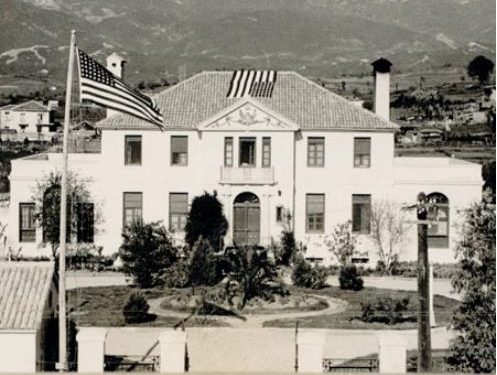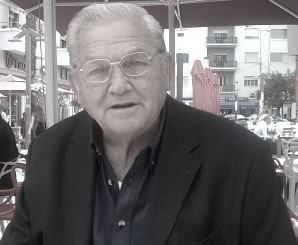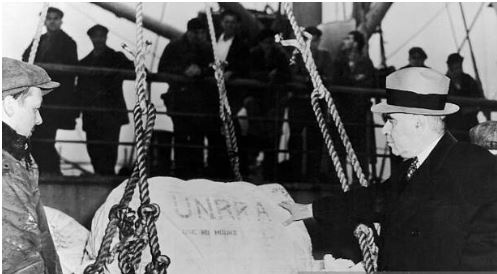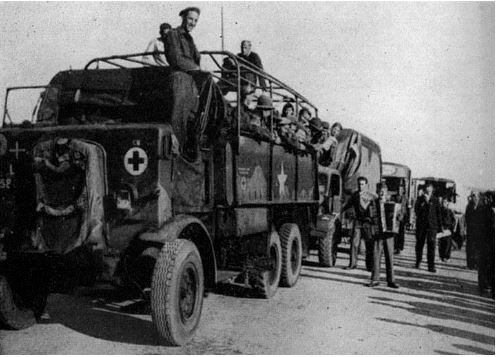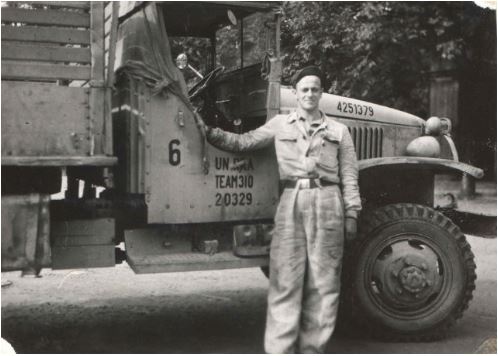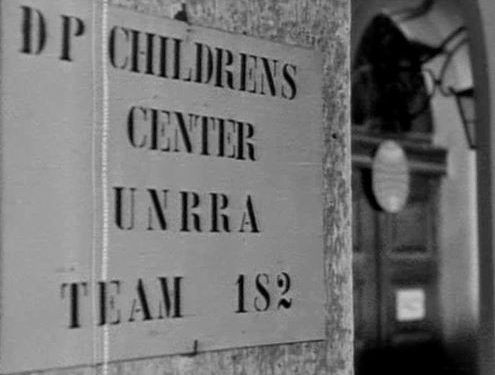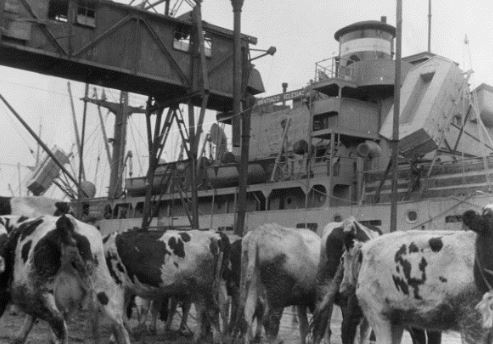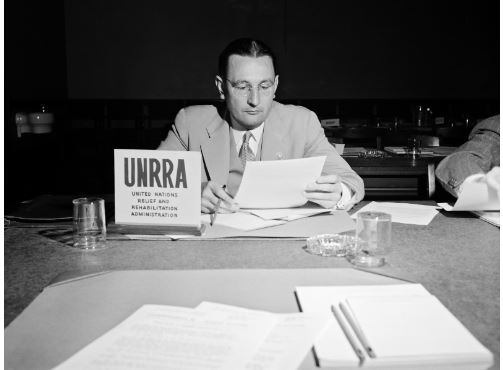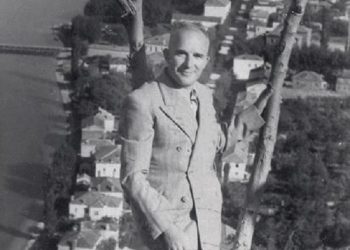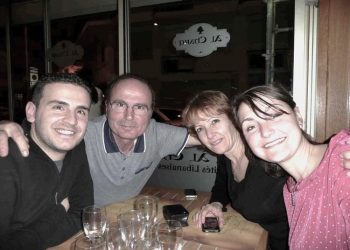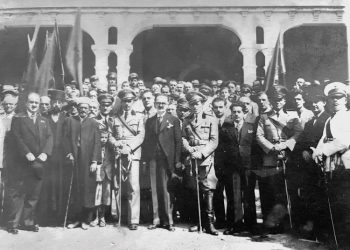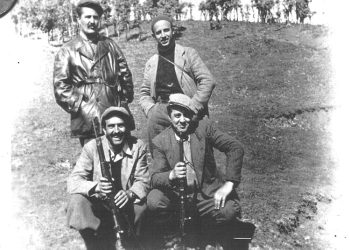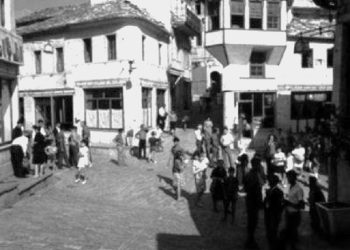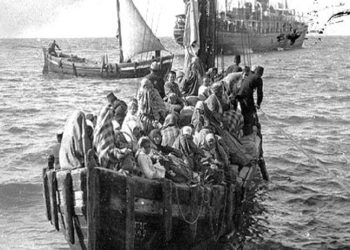Memorie.al / When Durrës after the end of the Second World War was almost on the verge of mourning, UNRRA ships arrived in the mined and destroyed port of the city. Professor Ramazan Beja, head of the large tribe of Bejas of this city, whom his students called Xhoda, and this is how his friends and former students continue to call him even today, says that; “When the city was languishing from the hunger left by the years of war, and mourning was knocking everywhere, it was the arrival of UNRRA that made this mourning not felt. Since the time when the trade was interrupted, the warehouses were empty, the famine was threateningly approaching. Its arrival caused tons of food and clothing to flood Durrës, as well as the most advanced technology for the time, which the residents of the city of Durrës never forgot. UNRRA was the giant that came from the sea,” he says. That fed us in those difficult years and clothed us.
He remembers that he was only 11 years old when the huge ships of the UNRRA (Unity Nation Relief and Rehabilitation Administration) flooded into the dilapidated port. “They were large ships that used an unloading technique that we had never seen before. Therefore we followed their discharge for hours, with rare childlike curiosity.
The ships approached the shore, and with a safe mechanism, they opened a large gate that lowered it down and from this large bridge, large 15-ton Chevrolet trucks came out, loaded with large bags, barrels and large crates, which were on their way to the empty and hungry warehouses of the state”.
What did UNRRA bring to Durrës?
Xhod Beja remembers in detail the many articles that UNRRA brought to Durrës. In addition to the memory, he also refers to the later documentation that has passed into his hands. According to Beja, “Ford”, “James”, “Chevrolet” trucks were brought to Durrës with these big steamers. Small 4-seater “Willis” jeeps. “Some trucks were equipped with front organelles, which we were seeing for the first time.
They brought the first ‘Beli’ bridges, which were used to cross rivers and streams, as the bridges had been completely destroyed by the war. They brought 500 HP Ford tractors for agriculture, motor generators for villages and towns. The Durrës electric motor was removed from the site and replaced with a much more powerful motor, while the existing one was sent and assembled in Rrogozhin.
For the first time, 20-ton refrigerators, with a volume of 30 m3, came to this city for the storage of agricultural products. Immense medicines were brought. Quinine, oleaginous penicillin, even ‘Jersey’ calves and ‘Maltese’ goats as well as American chickens. The animals and chickens were arranged in the squares of the Port of Durrës and then they were sent to the villages. The materials were numerous, so that sometimes as children, we noticed how the squares were overflowing.
And they set out to distribute them in convoys, with up to 50 large trucks. After a while, another motorcade left. And so it continued…! UNRRA has also brought thousands of tons of clothes, clothes and shoes, all gifts of American citizens, clean, packed, to be distributed and worn”, remembers Xhoda.
Food brought to Durrës
“UNRRA brought to Albania wheat, corn, flour, Argentinian buckwheat, Cuban and Haitian sugar, white and red, cookies, biscuits, vegetable oil and fish oil, margarine, canned meat and fish, powdered and condensed milk, large chocolates, which were previously distributed to soldiers at the front, as reserve food. Also drink. Cigarettes ‘Camel’ and ‘Lycky Strike’ matches.
A lot of food was also brought for the animals: Ghee, pressed peas, pressed cotton seed in the form of plates (90 x 60 cm), which as soon as they were put in warm water swelled up, tenfold in volume. All these foods”, Xhoda emphasizes, enriched with vitamins, were a choice food for animals. He remembers that the villagers in the district who fed the cows with these foods, from the 5 liters of milk they received per cow, managed to get up to 15 kg of milk, that’s how much yield the food provided.
The children of yesteryear still have memories of the packages brought to them, what they were; “Kismets”
Of course, for the hungry children of the city that had just come out of the war, the arrival of American food aid was for them a great blessing, which, translated into a more practical sense of our language, is luck. And UNRRA, it was their fate. Xhoda says that many varieties of packages had arrived for the children. He remembers that for the children, they brought several aluminum cylindrical boxes, in military color, that had numbers and letters on them and that contained torrones, candies, chewing gum, chocolates, cookies, halva, colored pencils, etc.
But in them, before it was opened, you couldn’t know what was inside. “Since we didn’t know what had fallen on us, we children called them boxes; “kismete”. Even for one of these gifts, Xhoda says that; they were afraid it was mine. For this occasion, he remembers how a friend of theirs, named Xhafë, brings a “kismet” with a key to the class.
. He placed it on the lectern and turned the key. “A monotonous hissing was heard”, remembers Xhoda.
“We were afraid that it was a time mine.” When the metal box was opened, warm pasta was found inside. The teacher showed them that the bottom of the box was double and filled with quicklime. Turning the key had caused water to pour over the lime. The quenching reaction had created the heat needed to heat the pasta. These types of boxes had different types of food that were sent to the front to the soldiers, who were thus fed, without the need for cooking in the canteens.
Xhoda remembers this episode, also as a proof that he gave them since childhood, of the practical American spirit. Aid received through the “Allied Military Mission”, such as; medicines, food, clothing, means of transport had a value, according to Professor Xhoda, of 32 million US dollars. This mission managed the huge aid donated by UNRRA, about 130 thousand tons with a value of 26.5 million dollars. Xhoda says that no more than 3 months passed, that the distribution of aid was free, when then the state began to sell all the aid, for money.
The communists use Durrës as a pretext for leaving UNRRA
The city of Durrës has served as one of the strong pretexts to go towards the elimination of good relations with UNRRA and then its final departure. Regarding the conflict that arose, to give permission to its personnel to go to Durrës, based on the information that was addressed to the American government, it is known that the Albanian government did not allow them to go unaccompanied to the city of Durrës, on the contrary, has asked them to provide a partisan guard as an escort, which was not well received by the Americans.
Jacobs, in his telegram to the US Delegation to the Council of Foreign Ministers in Paris, reported that: “Members of my staff, the English and UNRRA personnel, are being subjected to various restrictions. In December (1945…S.H.), the issuing of permits to drive to Durrës was also suspended (on Saturday afternoon, while walking in the hills around Tirana, the English press attache, Robinson, was arrested by the military…). Even if you are granted passage, you are obliged to be accompanied by a partisan…”! Jacobs presents some other difficulties, giving a bleak picture of the strained relations of the period.
He accuses the Albanian government, that it, unlike the traditions of Albanian hospitality, has shown more affection towards the Russians, whose anti-American attitudes, according to Jacobs, are instigated by Russian agents and trampling on their status; they have its situation in Albania, hopeless. For this he writes that: “Regarding the matter of our mission, the situation is delicate. Let’s be honest, he doesn’t have to stay.
He was sent here to study the situation and give a report, which has already been submitted…! I am sure that the authorities, especially those not social with us, are aware of our hopeless status, therefore they monitor our activity and show an unfriendly behavior, always increasing… even with the instigation of Russian agents. This feeling is very close to the Russian one, which has nothing in common with Albanian hospitality…”!
Port Reconstruction by UNRRA
According to the memoirs published by Feruz Mataj!
“The shipyard where we started work – Mataj will write in his memoirs, – had been the property of Tom Goga, which had been confiscated in December 1945. Meanwhile, in the first days of 1946, the old workers of the shipyard, together with a group of shipwrights, began to bring out the sunken ships on our shores and even repair them themselves. At first we took out the two sunken Italian tugboats and a motorboat, which was called ‘Mujo Ulqinaku’, then many motor-sails, barges, tankers, motorboats, etc.
“The two piers would be erected by UNRRA, bringing all the materials for the construction of the Durrës pier, and this same structure would build two bridges with wooden prefabs, in a record time. The regime would understand the importance and in February 1948, it would set up the General Directorate of Ports, which would have authority over 5 ports, from that of Buna in the North, to Saranda in the South, the Maritime-Commercial Fleet and Naval Shipyard”, writes Mataj in his book.
UNRA in the memories of Ago Agaj, political immigrant in the USA
Agaj reminds him that afterwards, Tirana was filled with food and chocolates from UNRRA (American Post-War Relief Organization), which filled Tirana with snow-white bread and all kinds of food and items. Military and American missions came after it, which were received coldly by the government and wholeheartedly by the Albanian people, who thought and hoped that good days, days of freedom, would come for them, from the influence of great allies , the winners of the great war.
Reshati writes in his diary: “The communist press was hitting the heads of both England and America every day, at the beginning of the Cold War, since then it had started in a hurry on both sides of the iron curtain. Russia lost nothing between us, except what it and Yugoslavia took from our war-torn economy.
There were only great and sweet words for them, as the eternal allies of Albania, as the brothers of the proletariat, and for the English and the Americans, who filled Albania with bread and medicine, especially with DDT, which saved the people from malaria and lice, no good word, no word of gratitude!
Indeed, at this time, it would be dirty to call yourself an Albanian. The Albanian has had a tradition to honor the friend who comes to his house and welcome him with bread and heart, with what God has given him, while the communists, not only did not give anything to these friends, who were falling so hard on them good and filled them with weapons and gold during the war, they were insulting and using them, in a really disgusting way. Especially the communist press”.
Agaj remembers that the Russians and Yugoslavs emptied the Albanian market. Take as an example that; when Shefqet Musaraj returned from a visit of Albanian writers to Moscow, he told them that in a Muscovite warehouse, he had found “Lux” soap from our “Pogu” factory in Shkodra, but in Tirana, you couldn’t find a piece of soap like that, as if you could kill seven, as they say! Memorie.al




